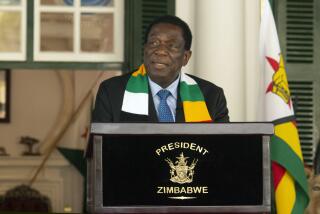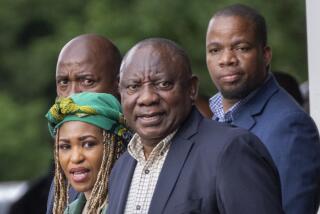In Zimbabwe, Foes of Ruler Fear the Price of Victory
HARARE, Zimbabwe — The welts on his leg are healing, but the fear in Cosmas Manyetu’s heart continues to swell. He has come to the white house on Fife Avenue to collect campaign T-shirts, but what he really wants is a gun.
The 26-year-old butcher waits on a wooden bench at the headquarters of the Movement for Democratic Change, Zimbabwe’s biggest opposition party. The newly formed political alliance has so shaken the status quo in this southern African country that President Robert Mugabe on Friday publicly defended militant supporters who have threatened civil war.
Parliamentary elections are due next month, and by many accounts, Mugabe’s ruling party is at risk of defeat for the first time since the white-minority rule of what was then Rhodesia ended 20 years ago.
Manyetu and the thousands of foot soldiers for the trade union-based opposition movement have little doubt that they will prevail. Zimbabwe’s economy is crumbling, and Mugabe’s autocratic--and increasingly erratic--governance is wearing thin with two years left in his term. The illegal and violent invasion of commercial farms by landless Mugabe supporters in recent months is the most visible sign of a country spiraling out of control.
But Manyetu, who has already lost his butcher’s shop and been viciously beaten and robbed because of his activism, says members of his predominantly black party are worried sick about the apparent price of victory. Even if Mugabe and his Zimbabwe African National Union-Patriotic Front, or ZANU-PF, are on their knees, nobody expects them to go quietly.
“We cannot afford guns, but I want one,” Manyetu says. “We know that they have guns, and we have to be prepared for war.”
Critics charge that Mugabe is encouraging more chaos by refusing to condemn the perpetrators of violence. But the attacks are being led by former guerrilla fighters from the black liberation struggle in the 1960s and ‘70s, a cause close to the president’s heart and the genesis of his political career. On Friday, speaking at a rally in the town of Bindura, he expressed solidarity with his former comrades in arms.
The war veterans, who are solid backers of ZANU-PF, are using the election campaign to press long-standing demands for faster redistribution of big agricultural lands still in the hands of their colonial-era owners. Although opinion polls show that land restitution ranks in importance behind unemployment, poverty and the economy among the electorate, it is an emotional issue, and Mugabe’s party has made it a cornerstone of its reelection strategy.
“Race is just a political trump card for the Mugabe government,” said John Makumbe, professor of political science at the University of Zimbabwe. “They are cranking this up so that it does appear real. It is not. It is manipulative and being used to serve their election purpose.”
Attackers Rely on Motley Arsenal
But the violence is real. Supporters of ZANU-PF have been assaulting their opponents with horsewhips, sticks, metal pipes and golf clubs both on and off the commercial farms they have seized.
On Tuesday, a mob attacked and shot to death a policeman investigating an assault on a farm owned by a prominent opposition supporter southwest of Harare, the capital. Two Democratic Change workers have also been killed in recent weeks, and countless others injured.
Morgan Tsvangirai, who heads Democratic Change, says he is overwhelmed by the unrest.
“All of a sudden, we have violence by ZANU-PF thugs everywhere,” he said during a brief respite from a series of crisis meetings. “The whole intent is to instill fear in the people. But it is Mugabe who is scared: He has come face to face with the reality that he is going to lose.”
In the past two months, the war veterans have illegally occupied more than 900 farms, building grass-and-mud huts and laying subdivision markers. Many of the protesters are being paid by ZANU-PF officials, and government vehicles, including some belonging to the army, have been seen delivering food and other supplies to the invaders.
The vast majority of Zimbabwe’s most productive land is owned by whites, descendants of the European settlers who followed Britain’s Cecil Rhodes into southern Africa in the 1800s. The so-called Lancaster House agreement that ended white rule in then-Rhodesia in 1980 anticipated the need for land reform, but change has been slow in coming.
Many of the farms that have changed hands since independence have been sold at bargain prices to high-ranking ZANU-PF officials, according to a list compiled by Margaret Dongo, a former party member who is now an independent member of parliament.
A new constitution was supposed to hasten the hand-over of big properties to poor blacks by allowing the government to seize farms without paying for them. But the ZANU-PF-authored document was defeated in a referendum in February, in large part because of a “No” campaign led by the Movement for Democratic Change. Opponents said such a draconian provision would shatter the confidence of international investors in Zimbabwe at a time when the economy was already in shambles.
The surprisingly strong “No” campaign received big financial support from the country’s 4,500 commercial farmers, most of whom are white. The result is an unusual alliance between the farmers and the opposition trade unions.
After the “No” vote, the former liberation fighters took matters into their own hands and began occupying commercial farms. Despite a court order to leave, thousands of veterans and other ZANU-PF backers have refused to budge. The Commercial Farmers Union says 940 farms have been affected, including 518 that are now under occupation. Several farmers are being held hostage in their homes.
“It is tense out there,” said Stephen Crawford, who compiles a daily activity report on the invasions for the farm group. “We are getting every kind of threat and intimidation imaginable. There are even farm workers having their shoes taken off and the soles of their feet beaten so they can’t walk.”
Police Complain of Shortage of Resources
Police have been trying to control the violence, but they say they don’t have the resources or political backing to forceably evict the illegal invaders. Parliament passed a constitutional amendment Thursday that will allow the government to seize commercial farms without compensation, furthering the resolve of the war veterans and their supporters.
“Some of the hard-core troublemakers have nothing to lose by staying on the farms,” said a Western diplomat in Harare. “They cannot make it in the private sector and depend entirely on the government.”
Across town from the headquarters of the Movement for Democratic Change, the seventh-floor offices of the Zimbabwe National Liberation War Veterans Assn. are also bustling. More than a dozen former soldiers, dressed in their Sunday best, crowd into a tiny reception room awaiting the arrival of Chenjerai Hunzi, the group’s chairman. Others, being deployed to newly invaded farms, fill knapsacks with sleeping mats, soap and supplies.
The chatter is about yesterday’s farm occupations and tomorrow’s anticipated ones. Some of the veterans carry farm leases and long lists of demands to be submitted to farmers. Several are suspicious of a visiting journalist--at one point forbidding him to take notes--but the mood is otherwise confident and celebratory.
“We will get our land because that is what we fought for, and without land this is not Zimbabwe,” Hunzi says in an interview. “When [the whites] came here and grabbed our land, it was not peaceful. Of course we don’t advocate violence, but we do not expect them to hand the land over voluntarily.”
Since the farm invasions, Hunzi and Mugabe have been talking a lot about the colonial past and the disproportionate economic power held by the 70,000 whites in this country of 12 million.
Mugabe this week warned Britain, the nation’s former colonial ruler, that “we can go back into the trenches . . . and fight for our land” if whites resist the redistribution. Any compensation to the farmers, Mugabe insists, must be paid by Britain because it was on watch when the land was taken in the first place.
The racial argument apparently plays well with some war veterans, but there is little evidence that it resonates among the vast majority of Zimbabweans. Since the end of the liberation struggle, race relations have been largely tranquil, exhibiting little of the explosiveness found in neighboring South Africa. ZANU-PF tried to win votes by vilifying white landowners ahead of the February constitutional referendum, but the strategy failed miserably.
Even Ian D. Smith, the country’s last white ruler, lives undisturbed in black-ruled Zimbabwe, commuting between a wealthy Harare suburb and a sprawling cattle farm in the Midlands. Long on the sidelines, he has recently reentered the political fray, bringing together several opposition leaders in his home for talks about a united front in the elections.
Tim Savory, a white farmer who grows tobacco and corn on about 7,500 acres near the town of Kwekwe, 180 miles from Harare, has about half a dozen war veterans on his property. He made a visit to the Commercial Farmers Union this week to report the license plate of a military vehicle delivering eggs and other food to the invaders. He was also in Harare trying to get a loan to expand an irrigation project on the farm.
Savory, 49, like most white farmers, says that he gets along well with his black workers and is not about to stop his work because of the political turmoil. He says most blacks greet him by his African nickname, Baba Guy, which means father of Guy, his eldest son. When the war veterans knocked down his front gate and claimed his farm, his black employees crept along the side of the house to whisper updates through his darkened window.
“I am Zimbabwean, and I am bloody proud of what I have achieved and am about to achieve,” Savory said. “The doctor who delivered me delivered my three kids and is still our doctor. . . . Every person who leaves this country makes it harder for the rest of us.”
His cell phone rang. It was his wife. She was scared. Two truckloads of war veterans had arrived on the farm. What was she to do?
“Listen, can you get home?” he asked. “Go down to Neville’s and ask him to go with you. And tell Guy to get registration numbers and everything like that.
“Look after yourself.”
He hung up. His mind raced through the day. Before coming to the capital, he had had a discussion with one of the war veterans, who had asked about dividing up his land. He told the veteran that the invasion was wrong and that he was breaking the law.
“I just hope I didn’t get them upset,” he said.
More to Read
Sign up for Essential California
The most important California stories and recommendations in your inbox every morning.
You may occasionally receive promotional content from the Los Angeles Times.










